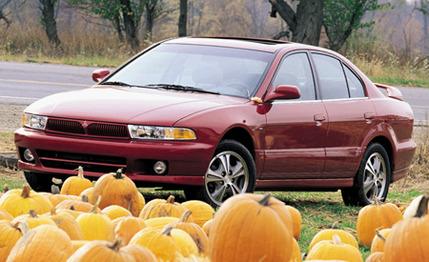 Long-Term Road Test
Long-Term Road Test
When a car that's won a spot on our 10Best list gets beaten in a comparison test by a car that didn't make the list, it's just a matter of time before foreheads wrinkle and letters to the editor double. This seems to have happened a lot recently. This month, the 10Best-winning Ford Focus placed third in our 13-car shootout (page 54). In February, an Acura 3.2TL upset a 10Best-winning Chrysler 300M. And last September, a Mitsubishi Galant ES outscored a 10Best-winning Honda Accord LX. So inquisitive gearheads must ask: What gives?
These apparent anomalies generally occur because for 10Best we consider an entire model range, whereas comparos zero in on specific models. The Accord LX lost to the Galant ES primarily because at 20 grand, Honda sells a blandly styled stripper sedan with a four-cylinder engine, and Mitsubishi sells an aggressively styled, nicely equipped one with a V-6. The Galant earned gold stars for the continuing refinement of its driveline and for its precise steering and nice ride. The only question remaining was how this Mitsubishi would hold up over a 40,000-mile grind.
A '99 Cayenne Red Pearl Galant GTZ arrived with exactly 98 miles of experience on its odometer. The $24,785 GTZ model gets a rear spoiler and a body-color grille, as well as a sport suspension with front and rear anti-roll bars and 205/55HR-16 tires on bright alloy wheels. Optional equipment included a $399 CD player, a $75 trunk mat, and $33 wheel locks. Out the door, it stickered at $25,292.
The GTZ's strongest feature is its 195-horsepower, 3.0-liter 24-valve V-6 engine. Copy chief Patti Maki's husband, Gary, wrote that he "loved the 'excelleration.' That's 'excellent acceleration.'" Still, a few drivers commented that the accelerator pedal is a tad overly sensitive. "The accelerator is jumpy," wrote Bedard. "I notice this particularly when trying to ease precisely into a parking space." And curiously, 1999 Galants were not offered with traction control, which this V-6 needs when accelerating with authority on slippery roads. (For 2000, this feature is standard on LS and GTZ Galants.)
Initial acceleration tests of the GTZ showed a 0-to-60 time of 8.6 seconds and a quarter-mile drill of 16.6 seconds at 86 mph. It also pulled 0.77 g on the skidpad. The last Honda Accord EX we tested with a V-6 was quicker at 7.6 seconds to 60 and 16.0 seconds through the quarter-mile at 88 mph. It outscored the GTZ on the skidpad by 0.03 g.
Galants go in for maintenance work every 7500 miles. Our first stop came at Big Automall Mitsubishi in Phoenix, where we were charged $41 for an oil change, a new oil filter, and a tire rotation. The owner's manual only calls for the oil filter to be changed every 15,000 miles, so we subtracted the filter cost from the official record, bringing the charge to $34.
At our 15,000-mile service, we paid $91 for an oil change, an oil filter, brake inspections, a tire rotation, and minor inspection of such items as brake hoses and driveshaft boots. Again, the dealer, Cortese Mitsubishi in Rochester, New York, socked us with the severe-duty maintenance schedule and replaced the air filter. The adjusted price came to $69. Caveat owner!
The Galant's logbook was sprinkled with favorable comments on its engine and ride. "Quite satisfying for high-speed interstate travel," a staffer wrote. Another said the "stability on highways allows a lot of miles to pass with little effort." "Tightly constructed car" was another keen observation.
More than a few drivers said the interior design was sparse. The wood on the dashboard is not wood at all, and a few drivers noted that in the logbook. There were niggling complaints of an absence of storage pockets on the backs of the front seats, an outside-temperature gauge, a trunk-release button on the key fob, and rear-seat armrests. We did like the two 12-volt outlets on the dash.
We also noticed at about 20,000 miles that the transmission started shifting more abruptly than it had when new. "The transmission is kind of a banger, particularly during part-throttle downshifts," wrote one tester. The problem was never bad enough to seek resolution.